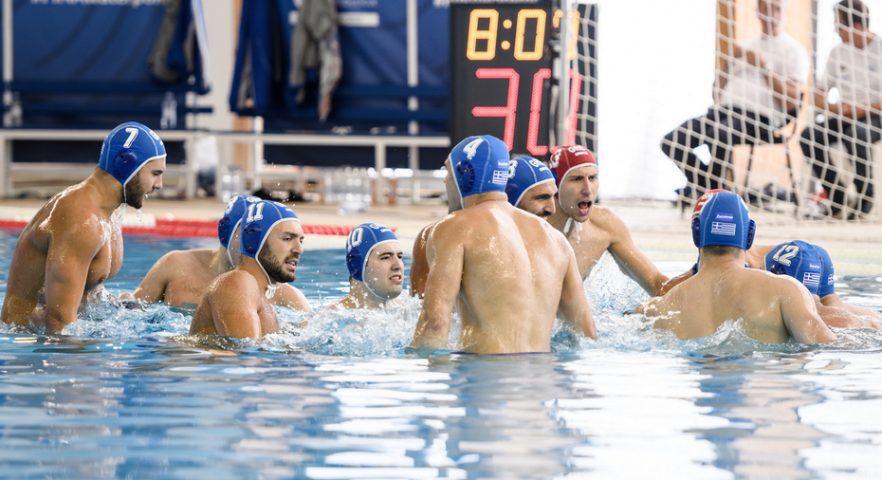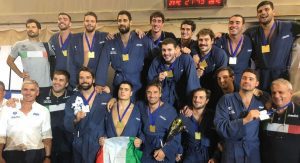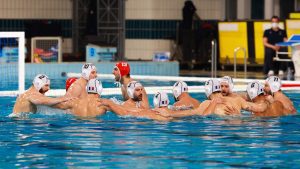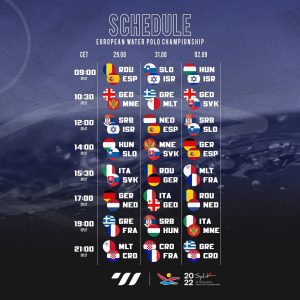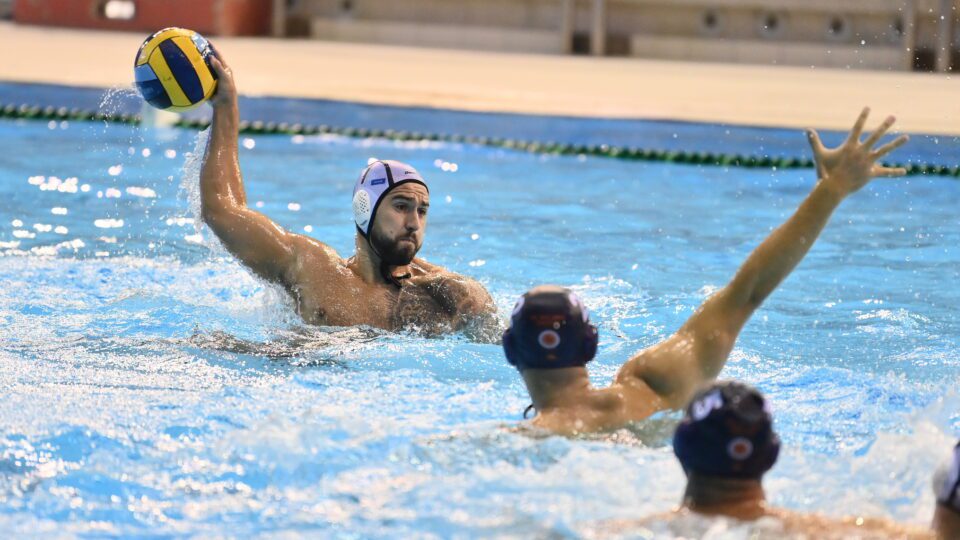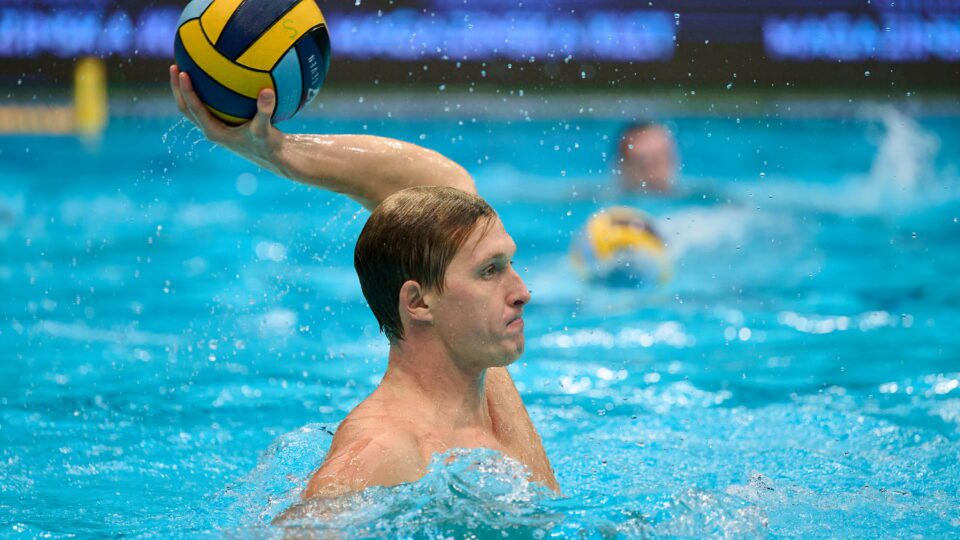The European Championships got underway in Split this morning, with the first round of the female tournament, while the warming up for the men’s tournament is close to an end.
The male competition at the 35th European Championships begins on Monday. The competition format has been unchanged for years. It is the same as at the World Championships. Sixteen teams are Split into four groups. The four group winners qualify for the quarterfinals, while the 2nd-placed and 3rd-placed will meet in the crossover round (the road to the medals is at the end of the article).
We start our preview of the men’s tournament with groups A and B.
Find out the stats and facts about the teams, the schedule, the road to the medals, and the list of all medal winners. The second part of the preview comes tomorrow.
2022 European Men’s Championships, Split, Preview (Part 1)
Group A
ITALY
Best result in the history of the ECH: three gold medals (1947, 1993, 1995)
2020 European Championships: 6th place
All-time statistics at the Europeans (32 appearances): 212 games (120 wins, 18 draws, 74 losses)
Players to watch: Francesco Di Fulvio, Marco Del Lungo, Edoardo Di Somma, Andrea Fondelli, Giacomo Cannella
Head coach: Alessandro Campagna.
MONTENEGRO
Best results in the history of the ECH: gold (2008)
2020 European Championships: bronze medal.
All-time statistics at the Europeans (7 appearances) – 52 games (35 W, 5 D, 12 L)
Players o watch: Dejan Lazovic, Marko Petkovic, Petar Tesanovic, Aleksa Ukropina, Dusan Matkovic.
Head coach: Vladimir Gojkovic
GEORGIA
Best result in the history of the ECH: 10th place (2020)
2020 European Championships: 10th place
All-time statistics at the Europeans (4 appearances): 25 games (5 W, 1 D, 19 L).
Players to watch: Boris Vapenski, Fabio Baraldi, Nikloz Shubladze, Andria Bitadze.
Head coach: Dejan Stanojevic
SLOVAKIA
Best result in the history of the ECH: 7th place (2003)
2020: European Championships: 14th place
All-time statistics (10 appearances): 65 games (13 W, 5 D, 47 L)
Players to watch: Lukas Seman, Samuel Balasz, Lukas Durik.
Head coach: Milan Orsula
Two former European champions, Italy and Montenegro, are front-runners in Group A. Montenegro has had more successes than Italy in recent years. The “Settebello” haven’t won a medal since 2014, and they haven’t climbed the highest step of the podium since 1995. Still, Italy is the first favorite here, considering the results achieved this year.
Italy has missed only two editions of the European Championships (the first and the third championship – 1926 and 1931) and they have won 11 medals (3, 2, 6).
The Italians have overcome the usual troubles in generational switches very quickly. Playing without a few very experienced players, who were the pillars of the team until 2021, they opened this summer excellently – with silver at the World Championships and gold in the World League. They have had quite good results in the preparations winning two very strong tournaments (Sardinia Cup and Serbia 2022 tournament), which is a nice encouragement with all results in official competitions.
Since its independence, Montenegro has been a regular participant in the European Championships. The Montenegrins debuted in Malaga in 2008, winning the title. After that, they added two silvers and the bronze medal to the treasury. The generational change in the Montenegrin team hasn’t passed so painless as in Italy. The Montenegrins had ups and downs this summer, but their last rehearsals before Split proved that they had improved their shape. They beat Spain in the preparations and play much better than at the beginning of the summer.
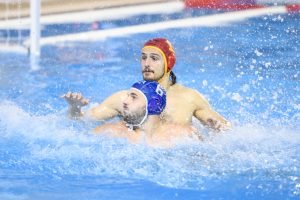
Montenegro’s goalkeeperPetar Tesanovic and Italy’s Giacomo Cannela, MVP of the World League Super Final Photo: K.Vulovic/VPSCG
Georgia’s most significant success at the European Championships was 10th place two years ago. The only team of the ex-USSR countries in Split debuted at the World Championships this year and finished 10th. They caused a lot of headaches to the favorites in Budapest. Montenegro and Hungary had trouble beating Georgia, the team whose pillars are players from the ex-Yu countries, coached by a Serb Dejan Stanojevic. Italy and Montenegro mustn’t underestimate the Georgians, who can surprise.
Slovakia will play at the European Championships for the 4th time in a row. The Slovaks didn’t have much success in the previous three editions. They didn’t finish higher than 13th place (2016). Early in the 21st century, Slovakia was occasionally a very high hurdle for the favorites. Yugoslavia (Serbia and Montenegro) narrowly beat the Slovaks (8:7) in the quarterfinals on their way to the title in 2001. Slovakia finished 8th then, and 7th two years after. If Slovakia finishes 3rd in this group, that would be more than a good result.
Group B
CROATIA
Best results in the history of the ECH: gold (2010)
2020 European Championships: 4th place
All-time statistics at the Europeans (14 appearances): 103 games (61 wins, 10 draws, 32 loses).
Players to watch: Marko Bijac, Ivan Krapic, Josip Vrlic, Loren Fatovic, Luka Bukic, Konstantin Kharkov…
Head coach: Ivica Tucak
GREECE
Best result in the history of the ECH: 4th place (1999 and 2016)
2020 European Championships: 7th place
All-time statistics (18 appearances): 130 games (53 W, 11 D, 66 L)
Players to watch: Stylianos Argyropoulos, Konstantinos Kakaris, Angelos Vlachopoulos, Alexandros Papanastasiou, Dimitris Skoumpakis
Head coach: Theodoros Vlachos.
FRANCE
Best result in the history of the ECH: silver medal (1927)
2020 European Championships: 13th place
All-time statistics (17 appearances): 105 games(31 W, 10 D, 64 L)
Players to watch: Ugo Crousillat, Mehdi Marzouki, Thomas Vernoux, Hugo Fontani..
Head coach: Florian Bruzzo.
MALTA
Best result in the history of the ECH: 15th place (2016)
2020 European Championships: 16th place
All-time statistics (3 appearances): 17 games (1 W, 0 D, 16 L)
Players to watch: Ben Plumpton, Matthew Zammit
Head coach: Karl Izzo
There is always at least one “group of death” at big sports tournaments. Group B is considered the toughest one in the male competition in Split.
Host Croatia, Olympic silver medalist Greece, and France, the team that has constantly been progressing in the past few years, are here with the only underdog Malta.
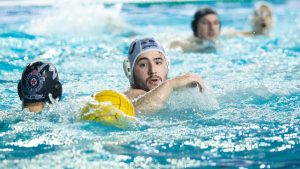
Konstantinos Kakaris, the star of the Greek national team and Croatian champion Jug Photo by Djordje Kostic/Nov Beograd
Greece made history by winning Olympic silver in Tokyo. After that success, the European Championship remains the only major competition in which Greece’s male team hasn’t won a medal. The Greeks reached the semifinals twice but finished 4th on both occasions.
This year has already been successful for the Olympic silver medalists, who won bronze at the World Championships. They repeated their best-ever result at the Worlds (third place in 2005, 2015 and 2022). Greece has done a lot in the last 13 months, but it is still hungry for success.
Greece and Croatia faced off twice at the World Championships in Budapest. The encounter in the group stage ended in a draw, but Greece was better in the more important game – the bronze medal match and prevented Croatia from winning the eighth consecutive medal at the World Championships.
The Croats have a chance to take revenge in Split on Friday, in the 3rd round of the Preliminary Stage.
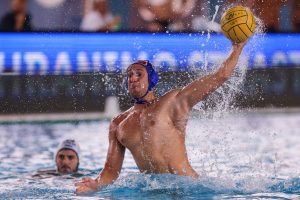
Newcomer to the Croatian national team Konstantin Kharkov was the best scorer of the 2020 ECH, playing for Russia Photo by S.Sandic/VSS
Host Croatia has played in the semifinals of the European Championships ten times and won four medals (gold, two silver, bronze). It failed to qualify for the semifinals just in 2006, 2012, 2014,and 2016. The Croats won their only European title at home court – in 2010 in Zagreb. We’ll see if Split will be a lucky city for the home team. Croatia is always medal contender, but the home field advantage can be “an extra player” and a burden simultaneously. The Croats had ups and downs this summer, but they are able to run the race for medals. The team is, like many others in the Championships, a mix of younger and experienced players.
Greece and Croatia didn’t avoid problems with injuries and health, and will play without some of the key players (Greece’s Fountoulis and Zerdevas and Croatia’s Vukicevic will miss the tournament)
France won a silver medal in its debut at the European Championships. But, it was in 1927, at the 2nd edition of the Europeans. The French were among the top 4 at the 1936 Olympic Games. They finished 6th in the Europeans three times in the 1930s, but after WW2, the quality of water polo started decreasing. France’s biggest success at the ECH in the 21st century was 9th place in Belgrade in 2016. But, the next year, Paris was awarded the 2024 Olympic Games, which greatly influenced French water polo.
Some things have started changing for the better. The country started taking more care of water polo. In 2019, Marseille became the first-ever French club with a European trophy (LEN Euro Cup). The national team proved its progress by winning 4th place in the World League. Nobody can underestimate the French anymore and can’t count on easy points against them. France isn’t a medal contender, but it is a team that is able to upset favorites.
Malta has played three times at the European Championships. The Maltese have recorded only one win so far, beating Turkey in the 15th-place match in their debut in Belgrade in 2016. It’s hard to expect they will achieve their second-ever victory in the group stage in Split. Still, Malta will have a chance in the classification matches.
Road to medals
Crossover round (September 4):
Match 1: 2A – 3C
Match 2: 3A – 2C
Match 3: 2B – 3D
Match 4: 3B – 2D
Quarterfinals (September 6):
QF1: 1D – winner match 1
QF2: 1B – winner match 2
QF3: 1C – winner match 3
QF4: 1A – winner match 4
Semifinals: (September 8)
SF1: winners QF1 – QF3
SF2: winners QF2 – QF4
Finals (September 10)
Final: winner SF1 – winner SF2
Matches for classification 3rd – 8th
All medal winners
1926 Budapest: Hungary, Sweden, Germany
1927 Bologna: Hungary, France, Belgium
1931 Paris: Hungary, Germany, Austria
1934 Magdeburg: Hungary, Germany, Belgium
1938 London: Hungary, Germany, Netherlands
1947 Monte Carlo: Italy, Sweden, Belgium
1950 Vienna: Netherlands, Sweden, Yugoslavia
1954 Torino: Hungary, Yugoslavia, Italy
1958 Budapest: Hungary, Yugoslavia, USSR
1962 Leipzig: Hungary, Yugoslavia and USSR (shared 2nd place)
1966 Utrecht: USSR, West Germany, Yugoslavia
1970 Barcelona: USSR, Hungary, Yugoslavia
1974 Vienna: Hungary, USSR, Yugoslavia
1977 Jonkoping: Hungary, Yugoslavia, Italy
1981 Split: West Germany, USSR, Hungary
1983 Roma: USSR, Hungary, Spain
1985 Sofia: USSR, Yugoslavia, West Germany
1987 Strasbourg: USSR, Yugoslavia, Italy
1989 Bonn: West Germany, Yugoslavia, Italy
1991 Athens: Yugoslavia, Spain, USSR
1993 Sheffield: Italy, Hungary, Spain
1995 Vienna: Italy, Hungary, Germany
1997 Sevilla: Hungary, Yugoslavia, Russia
1999 Florence: Hungary, Croatia, Italy
2001 Budapest: Yugoslavia, Italy, Hungary
2003 Kranj: Serbia & Montenegro, Croatia, Hungary
2006 Belgrade: Serbia, Hungary, Spain
2008 Malaga: Montenegro, Serbia, Hungary
2010 Zagreb: Croatia, Italy, Serbia
2012 Eindhoven: Serbia, Montenegro, Hungary
2014 Budapest: Serbia, Hungary, Italy
2016 Belgrade: Serbia, Montenegro, Hungary
2018 Barcelona: Serbia, Spain, Croatia
2020 Budapest: Hungary, Spain, Montenegro
Medal table: 1. Hungary 25 (13 gold, 6 silver, 6 bronze), 2. USSR 10 (5, 3, 2), 3. Serbia 7 (5, 1, 1), 4. Italy 11 (3, 2, 6), 5. FR Yugoslavia/Serbia and Montenegro 3 (2, 1, 0), 6. West Germany 3 (2, 0, 1), 7. SFR Yugoslavia 12 (1, 7, 4), 8 – 9. Croatia 4 (1, 2, 1) and Montenegro 4 (1, 2, 1), 10. Netherlands 2 (1, 0, 1), 11. Spain 6 (0, 3, 3), 12. Germany 5 (0, 3, 2), 13. Sweden 3 (0, 3, 0), 14 – 15. East Germany 1 (0, 1, 0) and France 1 (0, 1, 0), 16. Belgium 3 (0, 0, 3), 17 – 18. Austria 1 (0, 0, 1) and Russia 1 (0, 0, 1).
Note: The first criterion for the rankings is the number of titles, and the second is the number of silver medals.



